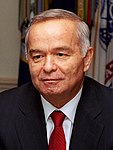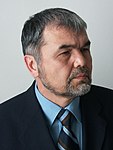
The Republic of Uzbekistan is a presidential constitutional republic, whereby the President of Uzbekistan is head of state. Executive power is exercised by the government and by the Prime Minister of Uzbekistan.
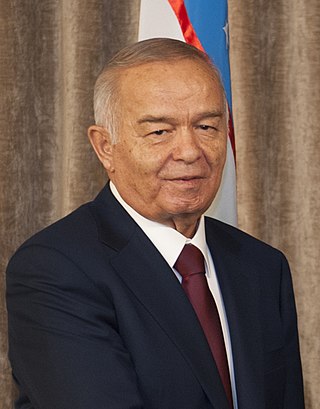
Islam Abduganiyevich Karimov was an Uzbek politician who led Uzbekistan and its predecessor state, the Uzbek Soviet Socialist Republic, from 1989 until his death in 2016. He was the last First Secretary of the Communist Party of Uzbekistan from 1989 to 1991, when the party was reconstituted as the People's Democratic Party of Uzbekistan (O‘zXDP); he led the O‘zXDP until 1996. He was the President of the Uzbek SSR from 24 March 1990 until he declared the independence of Uzbekistan on 1 September 1991.
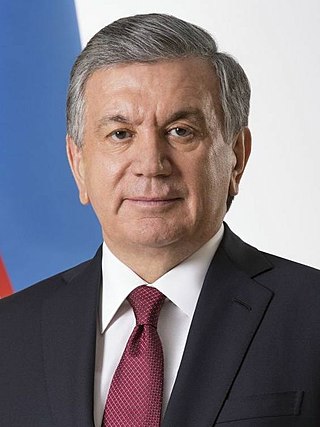
Shavkat Miromonovich Mirziyoyev is an Uzbek politician who has served as President of Uzbekistan and Supreme Commander-in-Chief of the Armed Forces of Uzbekistan since 14 December 2016. Previously, Mirziyoyev led the government as a Prime Minister of Uzbekistan from 2003 to 2016.
Sodiq Solihovich Safoyev, also known as Sodyq Safayev is first deputy chairperson of the Senate of Uzbekistan's Parliament, former Minister of Foreign Affairs of Uzbekistan from 14 March 2003 until 4 February 2005.

Belarus elects on national level a head of state—the president—and a legislature. The president is elected for a five-year term by the people. The National Assembly has two chambers. The House of Representatives has 110 members elected in single-seat constituencies elected for a four-year term. The Council of the Republic has 64 members, 56 members indirectly elected and eight members appointed by the president.

The Uzbekistan Liberal Democratic Party (UzLiDeP) is a political party in Uzbekistan and the country's ruling party. The four other parties in the Oliy Majlis, Uzbekistan's parliament, are pro-government.

The Erk Democratic Party is a political party in Uzbekistan formed in 1990 as a pro-independent party in the Soviet Union. It was the first registered political party in the history of Uzbekistan. Its charter was registered at the Ministry of Justice, Certificate of registration dated 3 September 1991, No. 039, which was signed by the minister of justice before the adoption of the law of Uzbekistan on political parties. The principal goals of activities, as written in the certificate on registration, are "the foundation of the independent democratic republic for Uzbekistan." Since 1993, its headquarters have been in Istanbul, Turkey.

Presidential elections were held in Uzbekistan on 23 December 2007. Incumbent president Islam Karimov was re-elected with 91% of the vote.

The People's Democratic Party of Uzbekistan is a political party in Uzbekistan. It was founded in 1991 as the legal successor of the Communist Party of Uzbekistan. Under its founder Islam Karimov, it oversaw the dissolution of the Uzbek Soviet Socialist Republic and the establishment of the Republic of Uzbekistan. After Karimov resigned from the party in 1996 and later formed the Uzbekistan Liberal Democratic Party, it lost its ruling party status.

Presidential elections were held in Uzbekistan on 9 January 2000. The result was a victory for incumbent Islam Karimov, who received 96% of the vote. Turnout was reported to be 95%.
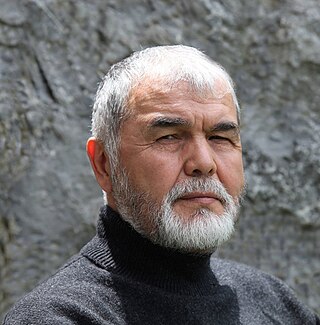
Muhammad Salih is an Uzbek political opposition leader and writer. He was the opposition candidate in the 1991 Uzbek presidential election, the first and only time an Uzbek president has faced a serious challenger in an election.
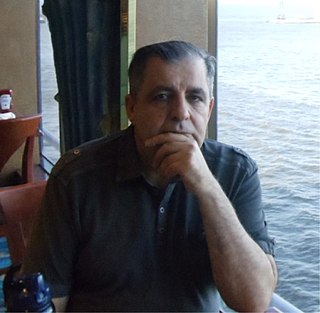
Jahangir Mamatov is a linguist, lexicographer, author, journalist, and a political analyst of Central Asian issues. He is a former member of the Uzbek Parliament and a co-author of Uzbekistan's Declaration of Independence. His writings, tenure in parliament, and other political activities were often greatly at odds with the Uzbek government. He was arrested but escaped into exile for many years. In 2005 he was instrumental in forming the democratic opposition group Congress of Democratic Uzbekistan (CDU) and became its first chairman. His writings are still banned in Uzbekistan.

General elections were held in Bangladesh on 3 March 1988. They were boycotted by several major parties, including the Bangladesh Awami League, the Bangladesh Nationalist Party, the Communist Party of Bangladesh, Jamaat-e-Islami Bangladesh, the Bangladesh Krishak Sramik Awami League, the National Awami Party (Muzaffar) and the Workers Party of Bangladesh. The result was a victory for the Jatiya Party, which won 251 of the 300 seats. Voter turnout was 52.5%.

Presidential elections were held in Bangladesh on 15 October 1986. The result was a victory for incumbent Hussain Muhammad Ershad, who had assumed the office in 1983 following a military coup. Ershad reportedly won 84.1% of the vote with a voter turnout of 54.9%. However the elections were controversial as they were boycotted by all major opposition candidates and there were reports of irregularities.

Presidential elections were held in Uzbekistan on 29 March 2015. The result was a victory for incumbent President Islam Karimov, who received over 90% of the vote. Karimov's win gave him a fourth consecutive term as president, dating back to 1990.

Snap presidential elections were held in Uzbekistan on 4 December 2016, following the death of incumbent President Islam Karimov on 2 September. The constitution mandated that the election be held within three months of Karimov's death. Interim President Shavkat Mirziyoyev won the elections with 90% of the vote. The elections were described by the Economist as a sham, and by the Organization for Security and Co-operation in Europe as lacking "a genuine choice".

Parliamentary elections were held in Uzbekistan on 22 December 2019, with a second round in 25 of the 150 constituencies on 5 January 2020. They were the first elections to be held after the death of Islam Karimov in 2016. The ruling Uzbekistan Liberal Democratic Party remained the largest party in the Legislative Chamber, winning 53 of the 150 seats. All five parties contesting the elections were regarded as loyal to President Shavkat Mirziyoyev.

Presidential elections were held in Uzbekistan on 24 October 2021. This was the sixth presidential election held since independence. Incumbent President Shavkat Mirziyoyev won a second term with a majority 80.1% of the vote, although faring the lowest performance for an incumbent in terms of vote share since 1991. Maqsuda Vorisova from the People's Democratic Party of Uzbekistan (XDP) was the runner-up and Alisher Qodirov from the Uzbekistan National Revival Democratic Party came third, which marked the first time that more than two candidates had officially received more than 5% of the vote.
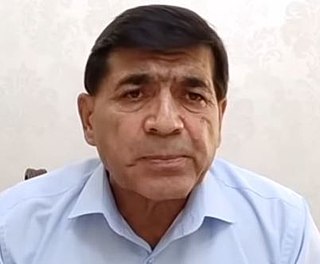
Khidirnazar Allakulov is an Uzbek scientist-economist, professor, and dissident. He is rector of Termez State University from May 2002 to June 2004. In early June 2020, he announced the beginning of the process of creating the Truth and Development Social Democratic Party (TDSDP) in Uzbekistan and his desire to run as a presidential candidate in the next presidential elections in 2021.
The People's Movement of Uzbekistan is an unregistered opposition political movement founded in 2011 by the Uzbek opposition leader and dissident Muhammad Salih, who is also the leader of the Erk Democratic Party, now living in Turkey.
